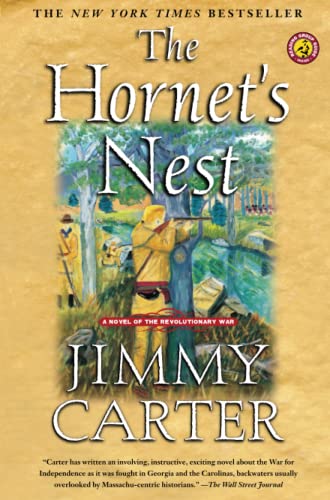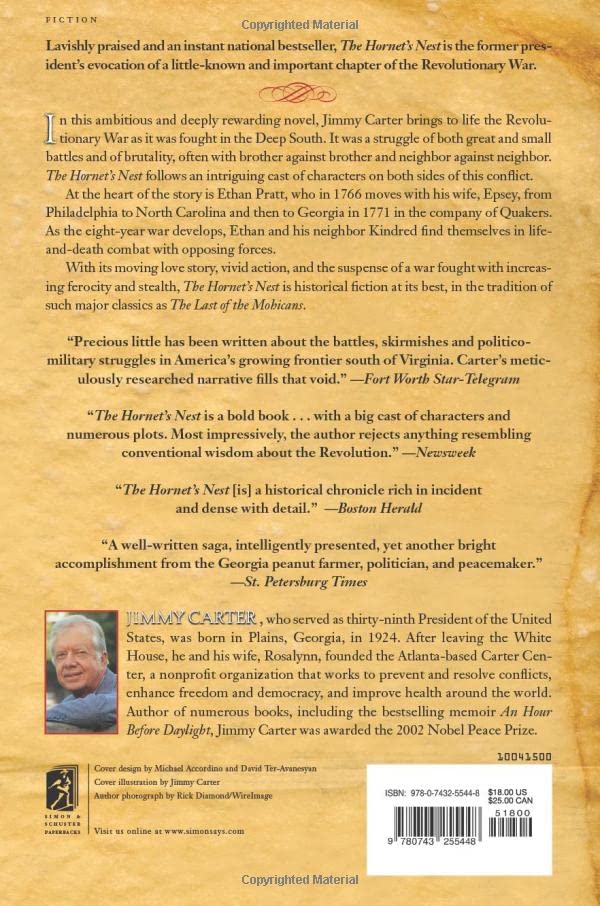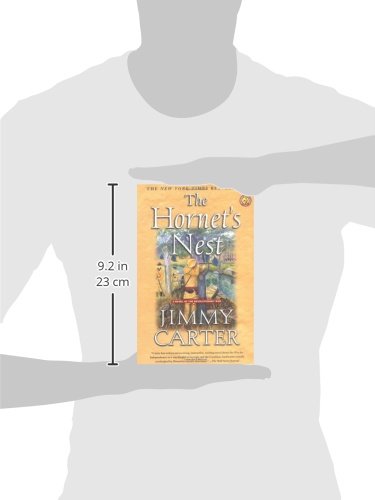



Full description not available
E**M
Very dry, but full of information
Jimmy Carter did a lot of research for this novel. I read it completely through once about 15 years ago. I have recently attempted to read it again, but it is difficult to stay interested the second time around. I seem to recall that problem the first time. That said, I learned an awfully lot from this book that I did not learn in history class. Honestly, I did not learn much in history class, even though I got good grades. I did not retain hardly any of it.What earns this four stars is the research that went behind this book, and the depiction of the American south during the Revolutionary War, in the form of a readable novel. That Carter was able to find so much of this information before the internet is both fascinating and awesome to me. Even though it is fiction, our former president somehow put what happened into a tangible story form that makes you remember. I do genealogy, and this book gave me the key to find out why much of the Quaker side of my family started off in Georgia and Virginia and moved north. I have access to Ancestry's card files online, and as I put together my own family's past, piece by piece, I keep remembering this book. Carter already put some of it together for me, after a manner, without even knowing it. With every little bit I uncover in some document, I think back to this book, and I am impressed at its accuracy. The Quakers were persecuted by both the English and the settlers. The novel also portrays the mindset that helped create the south after the country was formed. These are the missing parts in history that are not taught in public schools; the parts that might capture the interest of children. Carter may not be a particularly engaging novel writer, but he can put a story together in a tangible and relevant way. This book is a irreplaceable piece of my home library.
R**R
New look at the Revolution
This book allows one to see the Revolution from a different perspective. The South is normally not reflected in discussions around the Revolution and this gives the reader that opportunity to understand that the south played a huge part in the settlement of America.Good read...
J**A
WORTH THE READ
I wanted to read this for two reasons - first, I love ANYTHING about the American Revolutionary War Period, and second, I thought it was historically important, seeing that it is the first work of fiction written by a President (sitting or former) of the United States.That being said, I also wanted to REALLY like it. Having said all that, I found myself somewhere in the middle of the road in my final assessment of this book. I think Mr. Carter just tried to do too much here, all at once. There were way too many characters to keep tabs on, and more to the point, way too many viewpoints. I couldn't keep track of which character was who and what side they belonged on. I think Mr. Carter would have been more successful had he just followed the story of one character and let that story unfold. Still, I am very glad that I read it. You can see there was a GREAT amount of research involved, and I did learn a few things that I was not aware of before. So overall, a success!
A**R
We won?
A beleaguered group of people chafes under the control of a despotic ruler and revolts. Unleashed by the insurrection is a ten-year period of the bloodshed, property destruction, hunger, mayhem, atrocities, and even biological warfare. Syria? Somalia? Yeman? No! The novel, The Hornet's Nest, is the story of the American Revolution in Georgia and the Carolinas. President Jimmy Carter has not written the best historical novel that I have ever read, but in terms of revisionist history, I am glad I read it. I never imagined the part that slaves and Native Americans played in the assisting the British in their military victories and subsequent control of the South. I was stunned by the utter mismanagement of the Continental Army. It is a wonder that the colonists ever succeeded. The American officers do not cooperate with each other (to the point of dueling one another), they make huge tactical errors, and proceed despite catastrophic breaches in intelligence. But the colonists did succeed due in large part to the dynamic nature of the American people. The anecdotes about soldiers, farmers, wives, slaves, Native Americans, and Quakers are so compelling that I imagined several Hollywood films made from the carefully detailed passages. I really enjoyed learning about frontier life. Even though some of the language of the book is stiff, the American and British heroes portrayed knit the story together to make the long, intricate history understandable.
R**S
Compelling Reading
I have been doing some hobby research on the American Revolution. When I found a fiction story written by a former U.S. President about the Revolution in the Southern Colonies, my interest was piqued. The book introduced me to several real people I had not heard about before. It did an excellent job illustrating the conflicts between the British and the patriots while spinning an interesting story of how typical frontier people lived through the experience. I highly recommend "The Hornet's Nest."
D**R
Well written story of the Revolutionary War
I read this book several years ago and purchased the Audio CD today for a forth coming road trip to share it with my wife. Was surprised to see the negative reviews and felt I should write why I enjoyed the book so much. It was well written with an even pace, well describing the Revolutionary War located south of Virginia. An area not well covered by the many books on this chapter of our country's history. The author is particularly good at describing the lives of both men and women at that time, in this area, as well as the relationships between the many factions and peoples involved. Humor is used quite effectively to lighten the tale and I learned what it felt like to be "tarred and feathered", which was not humorous. I have always felt that many books fail to deliver a very satisfying ending. Reading the Hornet's Nest left me with a very intriguing ending thus keeping the story alive in my mind.
R**S
Fast Service
The book and back crackers I ordered arrived quickly and in good condition!
C**Y
Interesting and well written
This novel by former President Jimmy Carter was an eye opener as to the course of the War of Independence as concerned the southern states of the Carolinas, Florida and especially Georgia. The author's writing is very terse and descriptive almost in a non fiction style. However I found the story woven by Jimmy fascinating as it described the lives of early settlers to this region and their ingenuity and hard work in establishing their farms in the outback. The war between the loyalists and patriots as it unfolded in this novel cast two historical characters Elijah Clarke, a farmer and militia leader fighting for independence, against Thomas Brown an Englishman. Brown was captured by Clarke in the early 1770s and was tarred and feathered by him. Brown responded by forming the Florida Rangers which with the aid of Indians and loyalist settlers mounted a series of lightning raids into enemy territory. Both sides inflicted savage punishment on their enemy: Clark's militia slaughtered Indian women and children, Brown's Rangers hung many patriots. The course of the war in these states with retreats and advances on both sides is described in detail culminating with the departure of Cornwallis's British Redcoats to the North (and eventual surrender at Yorktown in 1781) leaving Georgia in the hands of the Patriots. Brown and his Rangers kept Florida part of the British Crown only for it to be ceded to Spain in 1783. Thomas Brown's exploits have been largely forgotten by future generations and I believe he deserves to be commemorated as a loyalist hero but of course history is always written by the victor
D**S
Five Stars
excellent
Trustpilot
4 days ago
3 weeks ago